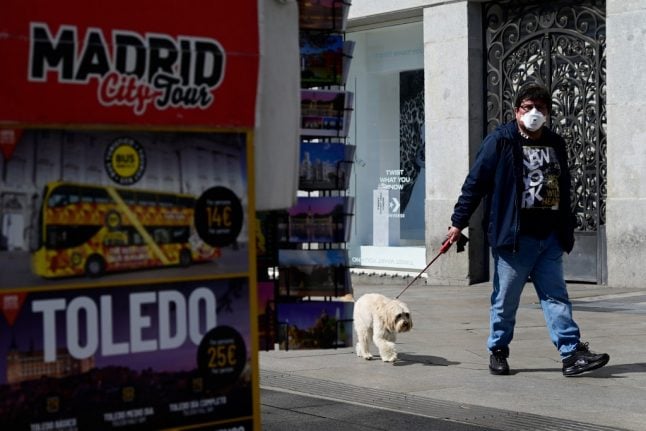Unlike in Italy, where people can go out to stretch their legs despite a national lockdown, Spain has banned all such sorties under its state of emergency.
But they can go out if they have a four-legged friend — for a brief walk and only to carry out the bare necessities.
“You go out more often but for less time,” says Luis Fe, a 49-year-old teacher walking Dara, his border collie, near a church in Madrid.
Other dog owners are the same, he says: going out “just because they can, or because they are bored at home.”
With numbers of cases spiralling, Spain on Saturday introduced a nationwide lockdown to try and curb the spread of the virus that has now infected more than 17,000 people, making it the fourth worst-hit nation in the world.
And barking is one of the few sounds that break the silence of Madrid's eerily-deserted streets.
READ LATEST:
- Madrid converts hotels into hospitals to treat coronavirus patients
- LATEST: Spain's coronavirus deaths jump by a third overnight
Rent-a-dog
With no scientific evidence that animals pass on the virus to humans, having a dog is now seen as an enviable freedom pass for housebound Spaniards.
“One dog owner told me someone had sent him a message asking if they could rent his dog,” Fe says.
And the idea seems to be catching on.
“If anyone wants to get out for a walk, I will rent them my dog,” read one advert on Milanuncios, Spain's online classifieds site.

Not everyone thinks it's funny.
“That's a nightmare — for other people's health and for the dog itself who's going out with a person they don't know,” tuts Alicia Barrientos, 39, who is out walking her Australian sheepdog.
And rival classifieds site Wallapop also pooh-pooed the idea, urging users to report any such dodgy dog offers.
But the subject had sparked a flood of humour on social media, from posts of pups punting themselves out at 15 euros a walk, to others collapsing in exhaustion: “But you've already taken me out 38 times today”.

At least one man in northern Spain thought he could get away with faking it — until police caught him dragging a stuffed toy along by a leash in a hilarious moment caught on camera by sniggering neighbours on a nearby balcony.
Pedimos SENSATEZ durante el #EstadoDeEmergencia por culpa del #COVID19.
Estamos ante una situación MUY GRAVE como para andar por la calle intentando engañar a la @policia… NO nos engañas y además serás sancionado.
Es una cuestión de salud pública.#EsteVirusLoParamosUnidos pic.twitter.com/67cjOMNdC3
— JUPOL (@JupolNacional) March 16, 2020
And it has caught on online with Facebook and Twitter flooded with similar clips, with one even showing a man getting ready to “walk” his daughter who is disguised as a dalmatian.
#YoMeQuedoEnMiCasa pero tengo que salir a pasear al perro ? pic.twitter.com/fhjA4ilhP6
— PEKADOR ?? (@pekadordealmas) March 15, 2020
It's not only in Spain, with a mayor in Sardinia forced to issue a public clarification that the dogs being walked “have to be alive” while in Rome, some people have even been spotted walking pigs.
By AFP's Thomas Perroteau
Rules for taking the dog out during lockdown in Spain
Only one person allowed per dog, which means no sneaking out the entire family for some fresh air under the excuse of exercising the mutt.
No mask needed
Neither for the owner or the dog itself. There is no evidence that the coronavirus can be passed between animals and humans.
Wash down urine and excrement
It’s not enough to just scoop the poop, during the coronavirus lockdown owners are also expected to rinse down areas where the dog has pooed or urinated so carrying a bottle of watered down detergent is a must.
Dog owners are also advised to wipe down the paws of their pet at the door when they return home to avoid the dogs carrying in any traces of the virus that they may have picked up from surfaces outside.
How long can I walk the dog for?

The guidelines state brief walks just to allow the pets to do the necessities, so no three-hour walks in the countryside apparently.
Can I meet friends who are also walking their dog?
Again, this is a strict no-no. The lockdown has been imposed to prevent people being in contact with each other and spreading the virus, so don't approach anyone outside the home. Always stay at least one metre apart.
Can I let them off the lead?
No, dogs must be kept under control at all times under the strict regulations that allow dog walks during the lockdown.
What if I test positive for coronavirus or have symptoms?
If that is the case then you are not allowed to leave your home under any circumstances (unless of course you are going to the hospital for emergency medical care). If you have a dog then you must arrange for someone healthy to walk it. Out a message on facebook or in your neighbour whatsapp group and we guarantee you won’t be short of offers.
READ MORE:



 Please whitelist us to continue reading.
Please whitelist us to continue reading.
Member comments